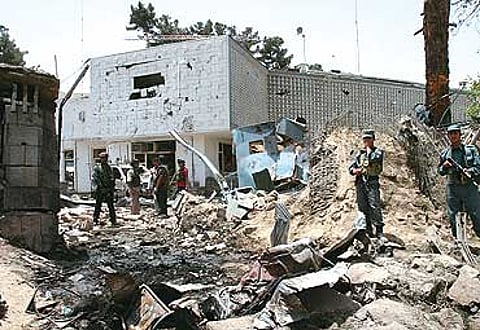The Lesser Evil?
The West's plan of engaging with the 'good Taliban' worries India
- Believes the Taliban is wedded to a fundamentalist ideology. Anyone subscribing to it can’t be good.
- The search for good Taliban could see the return of those under Pakistan’s influence. Through them Pakistan could regain its strategic depth, counter India.
- Could neutralise India’s influence in Afghanistan and also marginalise those who support Delhi.
- India trying to revive trilateral cooperation with Russia, Iran to protect interests while maintaining ties with US.
***

India is said to be opposed to the "good Taliban" theory because it fears the return of forces which can be easily manipulated by Pakistan. This could enhance Pakistan's influence in Kabul because of Islamabad's control over the Pashtun leadership (many of whom are members of the Taliban). Once again, it is argued, Pakistan could acquire the "strategic depth" or assured peace on its western border to concentrate its entire energy on the eastern border with India.
These fears have partly been stoked by history. When the Taliban took over Kabul in the mid-'90s, India, along with Russia and Iran, helped prop up the Panjsheris and their leader Ahmad Shah Masood, whose militia constituted the only pocket of resistance against Mullah Omar and his followers. Post-9/11, when the US and its NATO troops drove out the Taliban from Kabul and elsewhere, India became a key player in the reconstruction efforts in Afghanistan. It has committed $1.3 billion on various projects, and provided assistance in health, education and infrastructure. India has also undertaken hundreds of small projects at the grassroots, each identified and executed with the help of the local population.
These small projects have helped raise India's stock among the tribal elders, who don't find their traditional leadership threatened. This is in sharp contrast to the situation in the Pak-Afghan border area where the Taliban have systematically destroyed the tribal structure. Blowing against the theory of India's opposition to Pashtun dominance, a senior official points out, "We are not against the Pashtuns who are in a majority in Afghanistan. In fact, most of our work involves all the ethnic groups there."
But what India is opposed to is the new efforts to cultivate those fundamentalist Pashtuns who are wedded to violence. This could embolden Islamabad to exploit its proximity to the Taliban, neutralise India's growing heft in Kabul, and regain the kind of influence it once had over the country in the 1990s. The Taliban—good or bad—are opposed to India in fundamental ways. For instance, Taliban leader Jalaluddin Haqqani, in comparison to Mullah Omar, could be dubbed by some as 'good' Taliban. Yet, Haqqani is said to be responsible for the bombing of the Indian embassy in Kabul in July last year.
India has been engaging the US on Afghanistan. Simultaneously, though, it is trying to revive the trilateral cooperation with Russia and Iran, hoping to develop a countervailing force to the Pakistan-backed Taliban and Pashtun leadership. It's to be seen whether India can play both sides and yet retain its significant presence in Afghanistan.
Tags